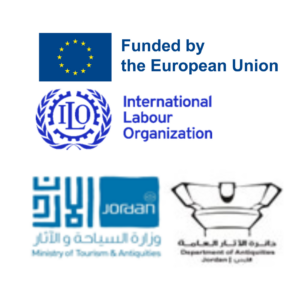Amman, April 2023 – Under the EU Madad Fund, UNESCO and ILO, in partnership with Acted, have initiated work at the Beit Eidis site as part of the project "Support to Livelihoods through Cultural Heritage Development", which aims at ensuring sustainable livelihoods and creating job opportunities for vulnerable Jordanians and Syrian refugees through the implementation of employment intensive schemes in Cultural Heritage sites
Under this project, rehabilitation and maintenance work will be carried out at the Beit Eidis site, ensuring the preservation of Jordan’s rich cultural heritage while creating short-term employment opportunities for the most vulnerable members of the Syrian refugees and local community. Beit Eidis, a Byzantine site located in the hills of the Jordan Valley 33 kilometres south-west of Irbid, lies on the Jordan Trail, a long-distance path popular with tourists and hikers, which connects Jordan from Um Quays in the North to Aqaba in the South. The site therefore has significant potential to become a popular destination for tourism but is currently not well promoted for visitors.
Rehabilitation works will include clearing the site of invasive vegetation and stones, stabilizing the walls and plaster of the ancient church, conserving the mosaic floors, installing fences to protect the site from potential damage, and creating and restoring trails for visitors to explore the site.
These rehabilitation and maintenance works will be implemented through a cash-for-work program, which will provide 48 workers with short-term employment opportunities and valuable on-the-job training. An induction training for the workers was delivered by Acted in Beit Eidis municipality hall on the 1st of March to introduce key information, including social security arrangements, codes of conduct under the project, and important safety messages. Works started the following day and are expected to be completed by July 2023.
Overall, the project aims to ensure dignified and sustainable livelihoods for Syrian refugees and vulnerable Jordanians in the cultural heritage sector. Income generating opportunities provided through the project will reach an estimated 242 members of the community. More widely, the project targets the Beit Eidis community members through community awareness events that highlight the importance of preserving cultural sites to improve long-term economic opportunities in the local tourism sector.
Acted is pleased to work with UNESCO and the ILO on this project and contribute to both the preservation of Jordan’s cultural heritage and the support of the livelihoods of vulnerable Jordanians and Syrian refugees in the area.

